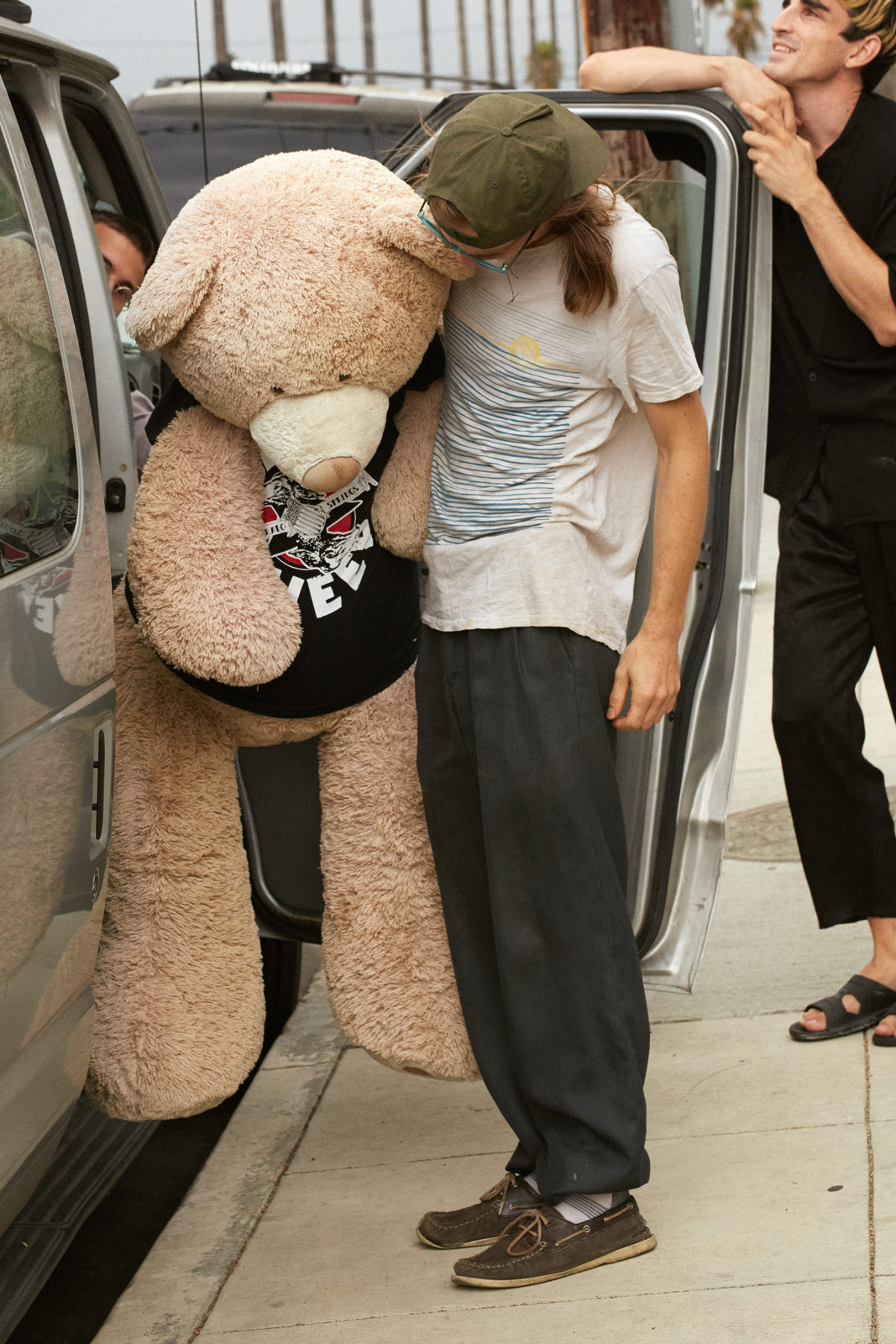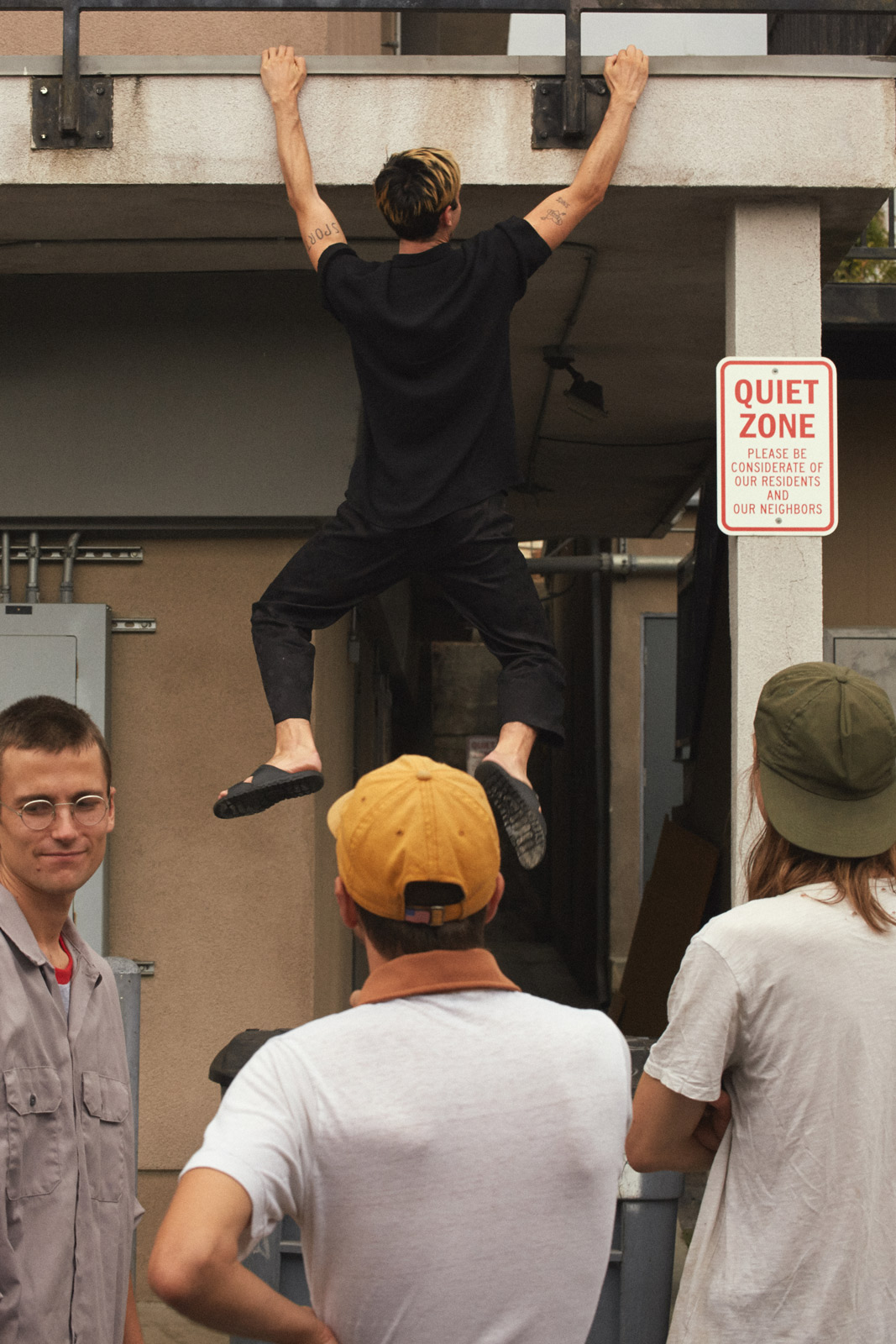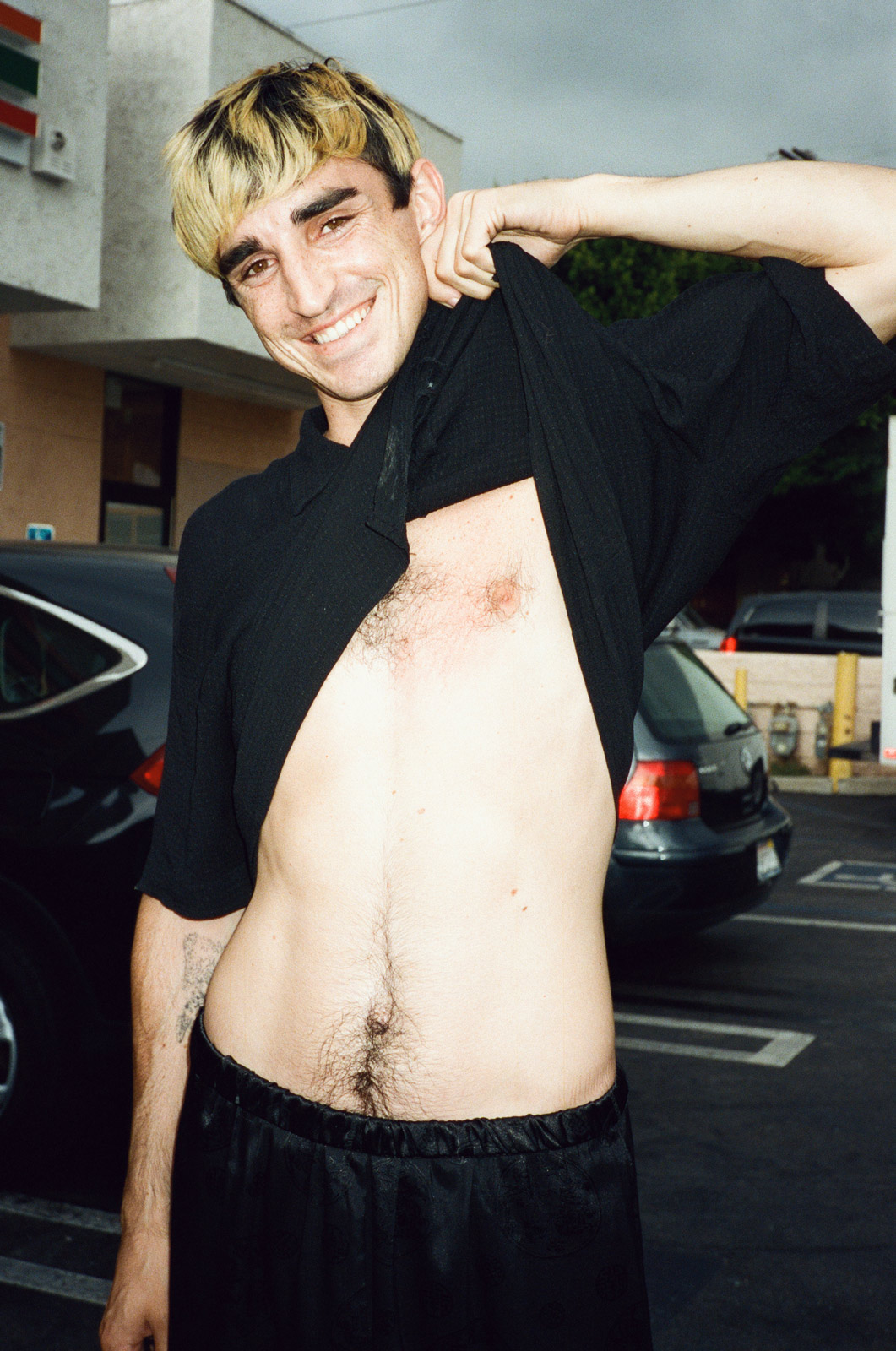On ‘Deceiver,’ the Brooklyn-based musicians own their mistakes and find hope in the rubble.
A few weeks ago, I sat down with Andrew Bailey, Colin Caulfield, and Zachary Cole Smith, three members of the Brooklyn-based rock band DIIV (completed by fourth band member Ben Newman) to discuss its anticipated, upcoming album. This is how I greeted them:
“This is nuts. You guys were the first record I ever bought and my first mosh-pit.”
It’s often said that you never forget your firsts, and this certainly rings true for fans of DIIV, whether the band is your first-anything or not. In 2012, they impressed the indie rock and shoegaze scenes with its debut album Oshin, the dreamy yet burning, reverb-drunken record that catapulted the band into notoriety. With these well-deserved highs, however, came a few troubling lows. In 2013, Smith was arrested for possession of heroin which publicly brought to light his struggle with drug addiction. Controversy continued to trickle into the press when ex-bandmate Ruben Perez was caught posting sexist, racist, and homophobic remarks to the online imageboard 4chan in 2014. The issues the band was facing at the time, primarily with addiction, inspired Is The Is Are, the band’s 2016 follow-up album that earned widespread praise and acclaim.
But raving reviews and sold out shows still couldn’t put a band-aid on deeper issues the band continued to encounter. A break was needed, and over the course of time away from the spotlight, clarity was found. Now, three years after the release of Is The Is Are, DIIV emerges from tumultuous times and personal struggles with its third full-length album Deceiver. As the title implies, the 10-track album explores how lies can lead to everything falling apart—be it with the band members’ personal relationships, their relationships with each other, or the bleak state of the world we all find ourselves trying to navigate. The album is a no-bullshitter. Produced in collaboration with producer Sonny Dipperi who’s worked with legendary acts such My Bloody Valentine and Nine Inch Nails, the album is heavy, it’s honest, and in a surprising twist, it’s hopeful. Through distressed, gravelly guitars, persistent drums, and vaporous, gently strained vocals, DIIV surrenders to the harsh weights of the world, and instead of being buried, finds a way to breathe and pick up the pieces again.
Kaylee Warren—So it’s been three years since the last album, but more importantly, three years since I saw you, Cole, in Metropolis [Vintage] on 3rd Avenue, talking on a flip phone. I have questions.
Zachary Cole Smith—I used to love that place. That was my shoe spot. I was into these weird booties, I had a shit load of them. Kinda pointy. They were like Zelda shoes.
Kaylee—[Laughs] Amazing. So how does it feel to be releasing music now, as opposed to 2012 when you guys first landed on the scene? A lot of growth has taken place for you guys.
Cole—There’s a huge difference. The last album was mostly about recovery, but it was a kind of a small exposure to it. [It was] knowing in a loose way that, ‘This is all the stuff I have to do,’ but for me and a lot of other people [who] are exposed to [recovery] it’s like, ‘Wow, that’s a lot of work, there’s gotta be some easier way.’ The difference between approaching Is The Is Are and this one is actually doing that work. It helped to approach the band with a new degree of honesty and gratitude that we didn’t really have before. It helped us with our own relationships with each other, working together and being able to communicate without some kind of unspoken thing in the room.
Colin Caulfield—It just feels really good now. I think because it was so trying and dark at times, now it’s just so easy to be so grateful for still being a band and still being able to make music that we really love together. Any kind of conflict that we run into together, whether it’s disagreeing about a song or just getting into an argument, just pales in comparison to actual difficult shit that happened in the past. Now it’s really fluid and easy as a band.
Andrew Bailey—I think, too, being in a band is like being in a relationship. With the long-term ones, it’s way more gratifying to get through the hard times. To fall out of love with someone and then decide to fall back in love again, I feel like we did that.
Colin—We’re in love.
Cole—Yeah.
Andrew—Mhm. [Laughs]
Kaylee—Beautiful. With everything that’s happened these past few years, it makes me think about ‘cancel culture’ becoming such a prevalent thing in pop culture and media. Did you ever worry that the bandmate drama or the arrest would change the way your fans perceived you? Or that it would be something for you to potentially have to ‘come back’ from?
Colin—At a certain point, it was like, ‘Wow, there’s a lot of news about the band that’s not about the music.’ I think we were all concerned that people were just going to get fatigued. [We were concerned about] just wanting people to still be interested in the music we were making.
Cole—In every sense of our lives, it was very important to examine our past actions and motives and reexamine them constantly. It was really tempting to avoid doing that.
Kaylee—For bands and even just in general, that’s a really hard thing to do, to be so brutally honest with yourself. Was it the discord that led to that for you guys? What allowed you to face reality and build from that?
Cole—A lot of the problems we were having seemed, from our perspective then, to be the problem. Like, ‘Wow, I can’t stop using drugs, that’s a big problem. I gotta fix that problem.’ But then, through honesty with myself and ourselves individually, kind of realizing that those things only seemed to be symptoms of the problem. Drug addiction, whatever it is, they’re all symptoms of these underlying things. They also make all of these lessons universal. They’re something that you can approach everything with, and I think it’s a huge way we approached the band coming back.
Colin—Being honest is uncomfortable in the moment, but it simplifies your life a lot. That goes for the way we interact as friends and as a band. Communication goes way faster. Then because of that, no one really holds grudges when you’re being honest. If there’s a problem and two people talk about it, you get through it and then you move from there. It’s a restarting.
Kaylee—Speaking of restarting, I noticed something really distinct in listening to Deceiver as opposed to past albums. Sonically, the signature reverb was there with those beautifully desperate, lush guitar sounds, but I noticed this optimistic note, musically as well as lyrically, that came as a bit of a surprise. I was wondering if, in this rebirth phase that you’re in, if you find yourself approaching production differently?
Cole—That hopeful thing is definitely there. There’s always problems, but side-by-side, there’s these solutions. That’s the difference between this record and the last record. We’re trying to live in a solution. It’s less of the brutal, ‘This is happening to me, it’s so terrible for me.’ There are solutions, they’re just difficult ones. A lot of the solutions, even if two problems are completely different, whether it’s, like, climate change or drug addiction, it comes down to personal responsibility. Thematically, there’s hope embedded in all of the songs.
Colin—Everything on this record is a response to something else on the record. The lyrics are hopeful in a lot of places but the music is also, and that’s a bit more abstract, and it’s hard to say why. I think it’s because the four of us are really honest with each other. It’s the sound of the band in a moment in time. It’s a huge relief it came across that way.
Kaylee—I definitely noticed that with ‘The Spark,’ which I would say is the brightest song on the album. It has these lighter tonal lilts and lyrics like, ‘It’s our past, we were such a mess / We did our best, only time will tell,’ that carry a sense of airy surrender. Listening to it, I was like, ‘Woah, this is DIIV?’
Cole—[Laughs] Musically, I think the idea [with ‘The Spark’] was to draw off the old DIIV sound a bit. Lyrically, it’s a straight-up love song. That’s a solution I found in my life, I mean, I’m engaged…
Kaylee—Yeah, I heard about that, congratulations!
Cole—Thank you! It’s been a huge part of what’s led me to where I’m at in the first place.
Kaylee—It was additionally sort of surprising to have the album end on a darker note, with ‘Blakenship’ and ‘Acheron,’ where the sound is grungier, more intense, almost like a battle, and the lyrics experience a dismal return. Why have it end this way after those moments of optimism?
Cole—I think it just felt honest, you know. I’m grateful and really lucky to have hope in my life because a lot of people don’t. For me, a big part of recovery is a spiritual question. It’s a really helpful way for me to think about the things that we can’t control. For me, for a lot of people, that shorthand thing is God. But I had a lot of difficulty with that, and I think it turns a lot of people away from recovery in general. It was just a real-time struggle.
Colin—The end of the record kind of frames everything else that happens on it and almost provides a setting. ‘Blankenship’ is about climate change and ‘Acheron’ is this exploration of, like, the pathway to hell. We touch on those darker emotions early on in the record, but at the end, it just felt right ending with that. Because things aren’t okay right now, even though the four of us are in a really great place, so we wanted to accurately reflect that.
Kaylee—Ending things on that more matter-of-fact note mirrors the way in which I feel like you guys are being more honest in your approach to the album itself. I was reading a Pitchfork interview you guys did in 2016, where, Cole, you mentioned how easy it is to project an image onto an album and how there were questions surrounding what would happen if you gave listeners your actual self. With Deceiver, does it feel like you guys are getting closer to the actuality of what you are and what this band is?
Cole—You know, I think that past record is a part of ourselves. Relapse is a part of recovery; failure is a part of success. You can’t throw that way. You can’t change the past. I think it’s just a part of our story.
Kaylee—In the past, have you ever felt a pressure to have a certain kind of narrative? With addiction, as musicians…
Andrew—I think most of the time we’re fighting narratives.
Colin—That was part of the intention with this record, and one of the reasons we worked so hard on it, harder than anything we’ve ever worked on in our lives. [Laughs] obviously, narrative and mythology is a part of every band, but we wanted to put as much of ourselves into the music, because above all, [DIIV] should be able to stand alone as something people can listen to and say, ‘I like this exclusively because of the music.’
Cole—Yeah, it was a big product of circumstance. We didn’t set out from the beginning to write about addiction. It happened, and we couldn’t change it. I got arrested and it’s public knowledge all of a sudden. In some ways, I’m grateful that I’m able to talk about it [without needing] to break the ice. Like, ‘By the way, I’ve been kind of going through this thing…it’s kind of hard’ [Laughs]. Struggling in the public eye gives us the ability to talk honestly about ourselves. Obviously I wish it didn’t happen, but it did, and now we have a platform [for] it, to try to de-stigmatize addiction and draw attention to how common it is.
Colin—And this is the best possible outcome of all of that. We have a record, we did it right, we’re all in good places. Really easily, that could’ve happened and the band would’ve stopped. I feel like if there are multiple, alternate timelines, in most of them, that happened. In this one, we did it right and now we’re able to do something positive with all of that shit, which is all you can ask for.
‘Deceiver,’ DIIV’s third full-length album, is out now via Captured Tracks.











































